Case Closed
A lesser-known fact about Hermione Granger is that, at her earliest origins in the mind of J.K. Rowling, her name was Hermione Puckle, both first and last names deriving admittedly from the plays of William Shakespeare. And now, so much drama surrounded this character on the eve of her debut on the stage... The delicious irony was not lost on me.
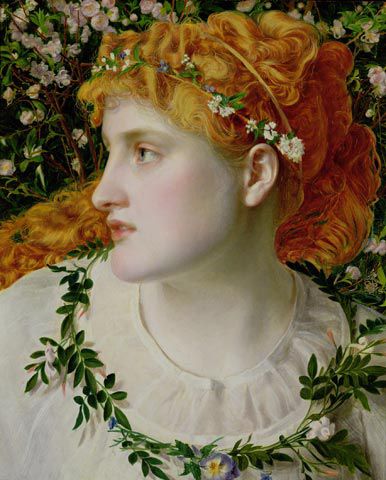
To conclude this exhaustive critique on the fragmentation of the fanbase through a casting decision, I believe that the material I showcased proves without a doubt that, while writing the books, JKR had envisioned a light-skinned, Anglo-Saxon girl for her female lead. While you may still disagree, I feel I did my best to lay out a nearly indisputable argument based heavily in canon, where opinion was not a factor. My hope is that, by validating both sides of the argument, the disjointed members of the Potter-verse can all come to a consensus and reconcile our differences.
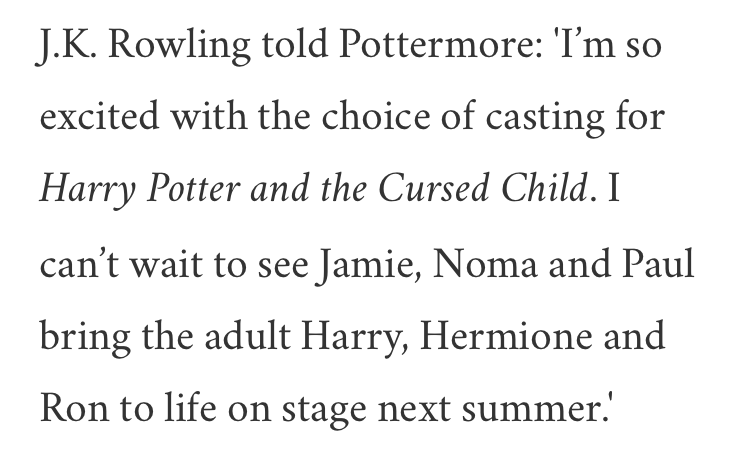
Like many of you, I took that first announcement as a bold and gutsy move. I saw it as taking a creative stance in order to remind people that this was a play and that you can make daring decisions in the theater business. Casting is always based on performance, not race. I agreed that there was nothing wrong with casting Hermione as black, just as there wouldn't be anything wrong with Asian Ron and Latino Harry. Go on with your bad self, Jo. It's cool. It's theater.
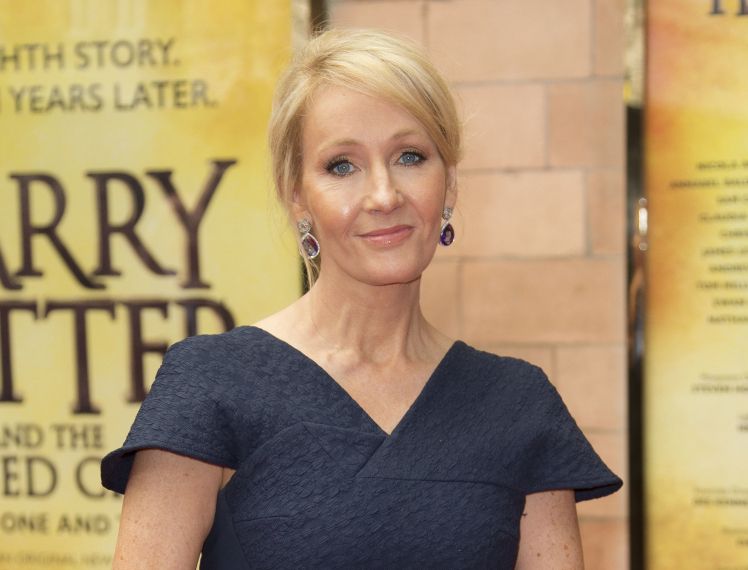
JKR's first reaction to the fans conveyed this point directly. "Noma was chosen because she was the best actress for the job." This bold statement lost its significance, however, with the recent recasting of the play. They have continued assigning black actresses to the roles of Hermione and her daughter, rendering the argument that Noma was the best actress inert. Clearly, they've made a conscious decision to reorient Hermione's race, which moves this conversation in a different direction.
This may be a concerted effort to change people's perceptions of the character, or it could be something else. Which leads us to an early counter-argument. To some, the casting decision was considered race-baiting.
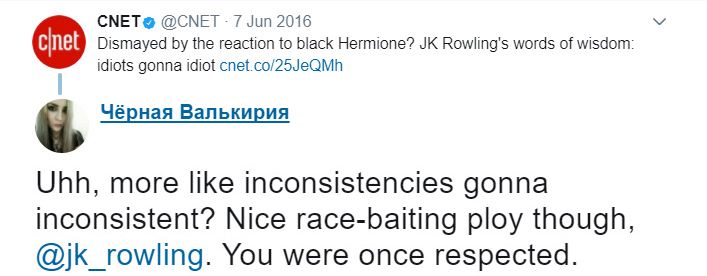
That undeniably loaded term has had numerous meanings in black history, but an accurate usage in this instance is that casting Hermione as a POC makes the production seem diverse while baiting black people and diversity apologists into falsely calling out well-intentioned, canon-minded Potterheads on racial discrimination (and making headlines in the process). The reason I don't like this claim is that it has such negative implications. Since I don't believe the casting was made with such backward intentions, I'll concede to a more appropriate (and perhaps more sinister) explanation. Something called Racial Capitalism.
We know from the accusations of the film casting for Fantastic Beasts, and the 6-minute Youtube video showing all the dialogue delivered by people of color, that the inclusivity of the Harry Potter franchise was being challenged. Not necessarily for discrimination, but certainly for not being racially diverse.
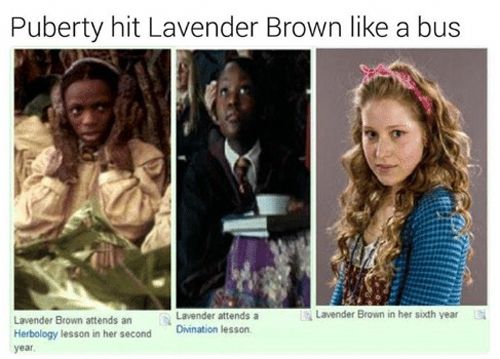
So why would they cast Hermione as black? Perhaps for the same reason colleges got schooled a while ago for Photoshopping people of color into images of student life on their brochures. The decision to break character norms through assigning an alternate race for Hermione may have been the result, not of the production's inclusive practices when it comes to casting, but rather an effort to boost the appearance of diversity.
Racial Capitalism is the process by which a commercial, for-profit entity (the Cursed Child production team) extracts value from the racial identity of another person.
By affiliating themselves with a diverse cast, it allows them to avoid existing charges of discrimination while aligning themselves with a demographic they didn't earn. To send the message home, they used some ambiguity of canon from the books as a shortcut, manipulating our impressions instead of taking the more difficult efforts to cultivate a lasting example of racial diversity.
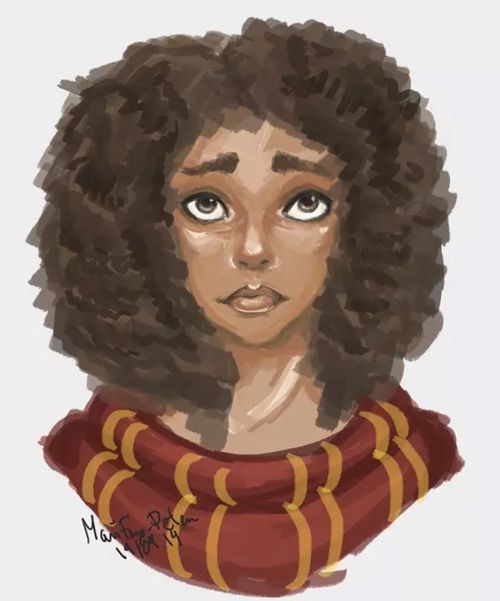
This isn't the real thing. It's glib. It's a gimic. It's borderline exploitative. It's deceptively communicating to the public that the production has done the difficult work of establishing diversity when it hasn't... taking a clearly white character and racebending them to seem inclusive. So, they shouldn't be getting credit for making that decision. Anyone can recast an existing character as black, but truly diverse choices should be meaningful and purposeful. With new, original characters. Instead, they count on us to be easily satisfied by fake diversity, hoping we won't see beyond the superficial decisions with which we're presented. And, for the most part, the production got away with it. They extracted value from a non-white identity while discrediting anyone in the fanbase who dared to examine its legitimacy.

Man, you're not letting this go, Mike...
Frankly, I'm not. Because the worst part about calling anyone a racist is that it's indefensible. It's a bully's approach to a disagreement. Unless there is some glaringly obvious proof to the contrary, calling someone a racist is a checkmate move.
Here's an example: I could claim right now that the author, J.K. Rowling, is a bigot because in HARRY POTTER AND THE PHILOSOPHER'S / SORCERER'S STONE she incorporated a trope from the Golden Age of pulp mystery novels that used the reader's own inherent racism against them. She brought back the bigoted concept of a red herring, foolish-sounding "foreigner" as her villain, through the use of a stuttering, turban-wearing professor. Her blatant bigotry was even more obvious in book three, when the prisoner on the run just *had* to be from the "Black" family.
Absurd, isn't it? No, I don't actually believe that J.K. Rowling harbors some hidden bigoted views. Far from it. But see how difficult it is to defend yourself against a false claim that could be viewed as a clear example of racism? Now you have to disprove a negative by providing evidence to the contrary. Which is why the tactic is unfair and particularly cruel when used to win an argument based on facts.
It's hitting below the belt...and something that can't be taken back.

JK, our dear Queen, you kind of insulted us. You called us racists. And idiots. We're just fans who were using *your* established canon as a basis for our confusion. Then you posted your disapproval on Twitter. You let the trolls into the dungeon, babe. We can sleep at night, because we know the truth about ourselves... but it's still not cool. And you gotta live with how that affected everyone, including Noma.
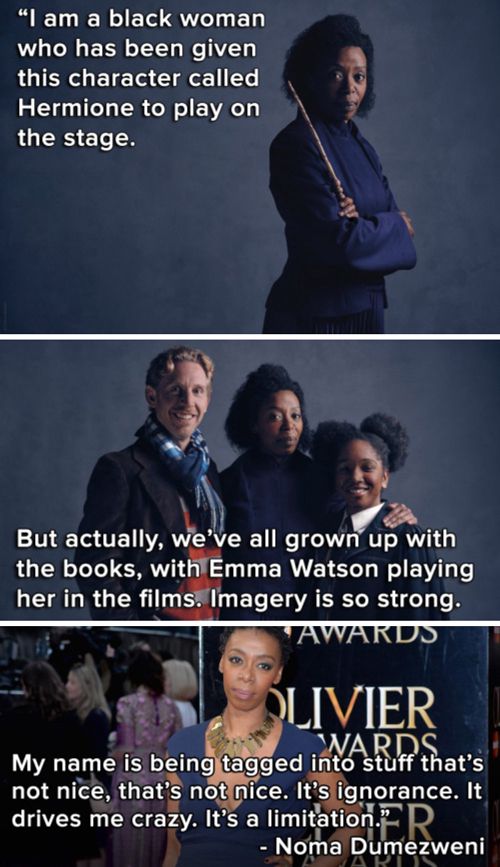
Did JKR make a few mistakes with this? Yeah, this was another example of some stubbornness in the face of a public relations flub. But I'm giving her a pass, again. Mainly because we know her heart in this situation. Her intentions have always been to promote equality and inclusivity. To protect the marginalized. The production, however, I'm not letting off the hook. Because let's be real, it was their call to make.

To the people who were frustrated that opposition felt like racism, I hope this all addressed your concerns and shown you why it may have been wrong to judge others so quickly. And to the people who refused to imagine Hermione as a person of color, I hope you've opened your mind as to why representation matters to minority readers and how art should have the license to be experimental in casting decisions. And to JKR and Co., I hope you've learned that maybe it's important to tread lightly in areas of canon and accusations against an entire group of fans (who you need to keep happy).
OKAY! I think the matter is settled.
In the books, Hermione is canonically white.
In the films, Hermione is canonically white, having been played by actress Emma Watson.
In the stage play, Hermione is canonically black, having been played by actress Noma Dumezweni.
I think it's awesome and you should, too. Her race shouldn't affect the performance or your enjoyment of the play. And if you think about it, this entire argument about race is actually the opposite of what the books promoted: That it doesn't matter how you were born, but who you strived to become. Hermione's skin color is ultimately inconsequential.
And look at this photo! Two beautiful women, sharing in the pure joy of knowing that both of them will be remembered for bringing a fictional icon to life.

I think you can see that all forms of art can be interpreted in different ways, and if there was ever a character to racebend, it's Hermione Granger. She is THE metaphor for strength in the face of adversity. Hermione as a POC adds to her narrative and better illustrates the socio-political themes that are already present in the Harry Potter story. All things considered, it would have been better for the production to embrace the decision and not waffle about the reasoning. Waffling (mmm...waffles) led to gaps in understanding, which allowed arguments in the fanbase to intensify.

Needless to say, the fears that canon-crazed fans like me had at this point were less about the casting of the play and more about the way canon was being treated. I personally cared very little about being called a racist, and more about the solidity of canonical material from the books not being respected by the "powers that be". Because, if they could so easily overlook and alter the characterization of a major protagonist from the books, what else were they going to overlook and alter? Were more canon deviations in our future? If they were actually baiting our interest, was it because they were concerned that the story wouldn't be enough of a draw? Were they going to bait or manipulate us in other ways? And what other norms were they willing to break?
We were on edge. That much I remember.
And then silence fell.
We got some challenging news that brought us together in a way none of us were expecting.
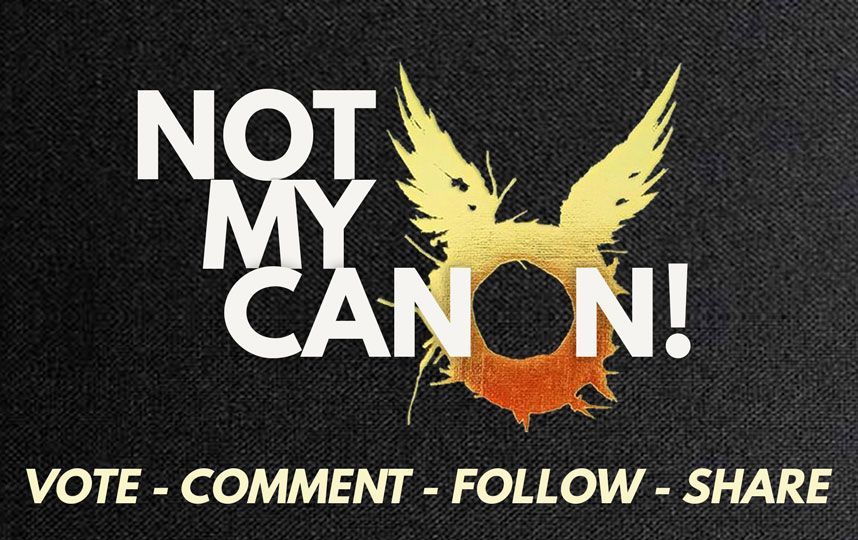
Bạn đang đọc truyện trên: Truyen247.Pro